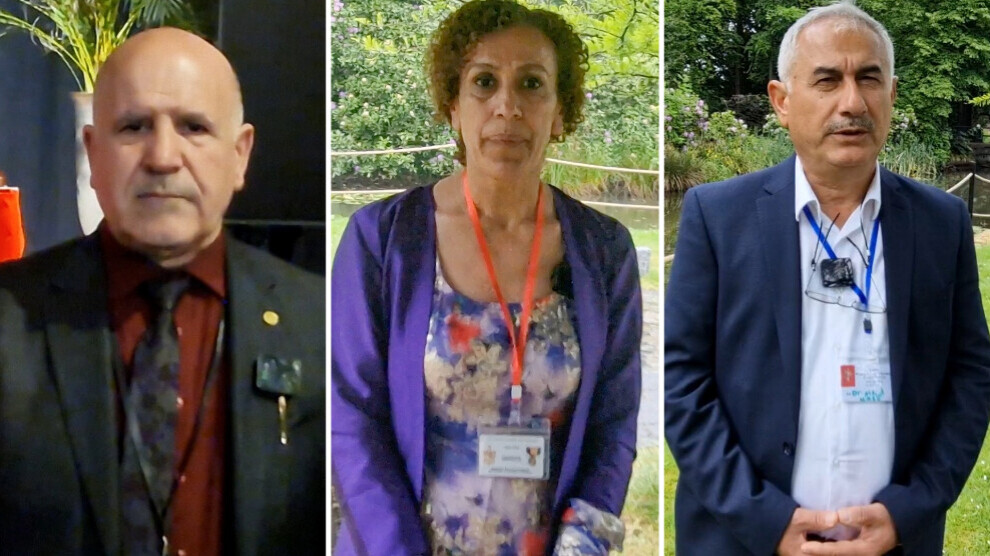Exiled politicians support Öcalan’s call for democratic resolution
Kurdish politicians in exile voiced support for Abdullah Öcalan’s call following the PKK’s decision to end its armed struggle.
Kurdish politicians in exile voiced support for Abdullah Öcalan’s call following the PKK’s decision to end its armed struggle.

Exiled Kurdish politicians evaluate the PKK’s decision to end the armed struggle and Abdullah Öcalan’s historic call.
They emphasize that developments in the Middle East highlight the need for Kurdish unity and a democratic solution, stressing that Mr. Öcalan’s physical freedom and political role are vital for advancing the peace process.
Dr. Mecit Haso, a member of the Kurdistan National Congress (KNK), reflected on Mr. Öcalan’s “Call for Peace and a Democratic Society,” drawing attention to the centuries-long history of war and fragmentation in the Middle East. Dr. Haso emphasized that the Kurdish people did not take up arms by choice but out of necessity and stated, “The Kurds have never preferred war. They want to live in peace, recognized as a people with rights, in their own language and identity.”
Dr. Mecit Haso recalled that the Kurdish region was divided without the will of its people, from the Battle of Chaldiran to the Treaty of Qasr-e Shirin, and said, “Deals were made over our lands and our people. It has always been the Kurds who paid the heaviest price. Today, both Iran and Turkey are working to prevent Kurdish unity. By fostering two separate centers of power in Southern Kurdistan (Başûr), they are blocking the path to unity.”
Dr. Haso stated that Iran has aligned itself with the Eastern Bloc (Russia and China), while Turkey is allied with NATO and the West. He emphasized that both sides instrumentalize the Kurds and obstruct their fundamental rights.
Mr. Öcalan’s recent call represents a historic turning point in the face of ongoing geopolitical manipulation. Dr. Haso described it as a remarkable act of foresight: “This is the foresight of someone who takes full responsibility. Neither is Mr. Öcalan lacking in vision, nor is the PKK weakened. Our people now need peace. The PKK took up arms not to wage war, but to make peace possible. This call offers a great opportunity. It is our shared responsibility to seize it on behalf of our people.”
Öcalan’s message belongs to the entire Kurdish people
Esrin Kedri, a member of the KNK in the United States (US), shared her views: “As a woman, and especially as a Kurdish woman from Eastern Kurdistan (Rojhilat), I wholeheartedly support the historic call made by Abdullah Öcalan. This call is not limited to a particular political group, a single organization, or one region of Kurdistan; it is directed at all patriotic Kurds and the entire Kurdish homeland.
The perspective offered by Mr. Öcalan opens the door to a new and transformative process, not only for the Kurdish people but also for all the peoples of the Middle East. Anyone who embraces the Kurdish cause must take this call seriously and claim ownership of it. This struggle is not only political; it is about the future of our language, our culture, and our identity. Securing the well-being of our peoples can only be achieved through dialogue and a common plan carried out with and for our people.
As a Kurdish woman, I specifically call upon Kurdish mothers and women: we must take greater responsibility. We must raise awareness among our people and institutions so that they protect our language and culture with greater determination. No matter what political belief, faith, or region we come from, our shared cause must be the struggle of our people. Our priority is to build a peaceful, equal, and free life.”
Kurds now demand a solution; a united future across three regions is possible
Dr. Yûnis Behram, Chair of the Deutsch-Kurdisches-Forum e.V., stated that Kurds can build a common future through a united struggle across three regions. He said: “What do Kurds want today? They want to see in Rojava a governance model similar to the system established in Southern Kurdistan. While it may not be federalism in the classical sense, Kurds demand a recognized and distinctive autonomous administration.
Mr. Öcalan’s recent call has created great enthusiasm, especially in Northern Kurdistan (Bakur). The peaceful and dialogue-based resolution of the Kurdish question is no longer just a demand of the Kurdish people but has become a shared expectation of the international community as well. In my view, if this process is carried out with a sound strategy and consistent struggle, a federal system in Southern Kurdistan, an autonomous structure in Rojava, and a province-like administrative model in Northern Kurdistan can all be achieved.
The Kurdish people have long rejected the artificial borders that were drawn between them. As these three regional systems move closer together, the vision of a Middle Eastern Confederation, proposed nearly a decade ago, can find a real foundation. This would pave the way not only for the Kurdish people but also for all peoples of the Middle East to pursue a democratic future.”